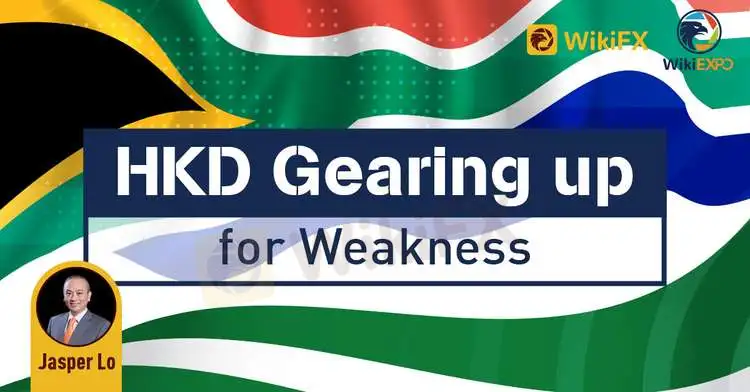简体中文
繁體中文
English
Pусский
日本語
ภาษาไทย
Tiếng Việt
Bahasa Indonesia
Español
हिन्दी
Filippiiniläinen
Français
Deutsch
Português
Türkçe
한국어
العربية
HKD Gearing up for Weakness| Influencer‘s Insight •Jasper Lo
Abstract:As of March 17, the balance of the banking system in Hong Kong has registered a record high of HK$457.5 billion. The balance has overshoot HK$450 billion for four months, attributed to the loose monetary policies of global central banks as well as the capital inflows through stock transactions and new stock subscriptions. With that said, the question is why the record balance would lead to a weak HKD instead? Is there any capital flowing outside Hong Kong?

As of March 17, the balance of the banking system in Hong Kong has registered a record high of HK$457.5 billion. The balance has overshoot HK$450 billion for four months, attributed to the loose monetary policies of global central banks as well as the capital inflows through stock transactions and new stock subscriptions. With that said, the question is why the record balance would lead to a weak HKD instead? Is there any capital flowing outside Hong Kong?
The earlier capital that flowed from new stock subscriptions has run away as stock transactions are no longer at peak times, which puts a discount on HKD, acknowledged Yu Weiwen, President of the Hong Kong Monetary Authority (HKMA). But I believe what he said is not the case. First, the recently soaring DXY has punished non-dollar currencies, including HKD and CNY, against the US dollar. Also, financial markets start betting on an earlier rate hike amid the surging US 10-Year Treasury yield. In the face of the sizeable balance, there is no need for Hong Kong to increase interest rates together with the US.

Similar cases happened during 2017-2019, when a significant interest rate spread occurred because the high balance at the time drove the Hong Kong banking system to ignore the US rate hike. Forex investors seized that opportunity to execute carry trades - sell HKD to buy USD, making the price of HKD not able to stay steady until it dwindled to 7.85. Given that both the Treasury yield and the dollar prices see their rise enduring and that the balance remains at a high level, HKD is set to receive further pressure. It is estimated that it will inevitably challenge the 7.85 level again this year.
Moving forward, the spiking Treasury yield has underpinned the DXY, hampering the currencies of emerging markets. The Turkish lira plunged 14.9% from 7.2 to 8.4850 after the governor of the Turkish central bank was sacked for keeping interest rates high. Financial markets are worried about these markets amid the country's chaos, since they often see capital outflowing to the dollar for risk aversion. However, it bodes well for the strong dollar. Chances are the DXY will soon climb back to the 93.2 level and shot up to 93.2 within this month. Notably, Powell is scheduled to give speeches for three consecutive days from Monday, in which he will continue not to deliver concerns about the rise in US debt. It will pave the way to gains in bond yields and keep bolstering the dollar market.

Disclaimer:
The views in this article only represent the author's personal views, and do not constitute investment advice on this platform. This platform does not guarantee the accuracy, completeness and timeliness of the information in the article, and will not be liable for any loss caused by the use of or reliance on the information in the article.
Read more

Key Forex Strategies
New to forex trading and looking for simple and effective trading strategies? We got you covered! In this quick guide, we'll explain some of the key forex strategies which are easy to digest. So, let's start!

Fundamental vs Technical Analysis
Fundamental and technical analysis play some of the most influential and critical roles in making trading decisions amongst traders today. They are widely accepted by stock, foreign exchange, indices and cryptocurrency traders worldwide. Traders use either or both of the methods to make key trading decisions in their respective markets.

Going Short of JPY Is Boosted by Yellen’s Remark on Interest-Rate Hikes Again
When interviewed by Bloomberg, Yellen, the U.S. Treasury Secretary, indicated that the USD 4-trillion budget released by Biden would be beneficial to America even if it may increase inflation and interest rates.

Brent oil is predicted of bullish repricing by Goldman Sach
According to Goldman Sachs' head of energy research, a nuclear deal between the U.S. and Iran could send energy prices higher - even if it means more supply in the oil markets. Talks are ongoing in Vienna between Iran and the six world powers - the U.S., China, Russia, France, U.K., and Germany - trying to salvage the 2015 landmark deal. Officials say there's been progress, but the conclusion of the negotiations remains unclear and oil prices have been soaring as a result.
WikiFX Broker
Latest News
SQUARED FINANCIAL: Your Friend or Foe?
Big News! UK 30-Year Bond Yields Soar to 25-Year High!
High-Potential Investments: Top 10 Stocks to Watch in 2025
Why Is Nvidia Making Headlines Everywhere Today?
Discover How Your Trading Personality Shapes Success
US Dollar Insights: Key FX Trends You Need to Know
FINRA Charges UBS $1.1 Million for a Decade of False Trade Confirmations
BI Apprehends Japanese Scam Leader in Manila
Bitcoin in 2025: The Opportunities and Challenges Ahead
Join the Event & Level Up Your Forex Journey
Currency Calculator






